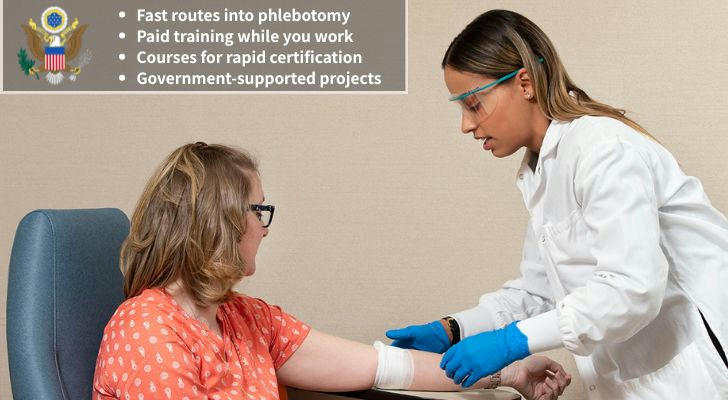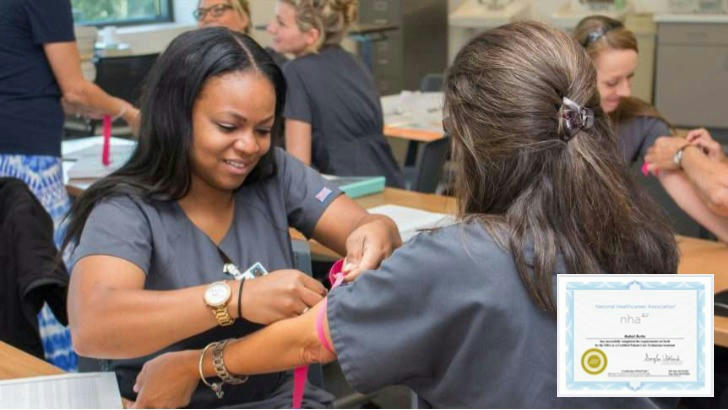🩸 Start a Healthcare Career with Government-Supported Phlebotomy Programs and Certification Courses in the U.S.
Phlebotomy offers one of the fastest and most practical entry routes into healthcare. With options ranging from government- or employer-supported paid apprenticeships to recognized certification courses, adults can gain clinical skills, earn income, and begin a stable medical career within just a few months.

⚙️ Section 1: Government- or Employer-Supported Phlebotomy Apprenticeship Programs
💼 Earn While You Learn — Build Skills Without Debt
Government and employer-supported apprenticeship programs allow trainees to earn $20–30 per hour while gaining supervised clinical experience. These programs are often recognized under the Workforce Innovation and Opportunity Act (WIOA) or the U.S. Department of Labor’s Registered Apprenticeship Program (RAP).
Program Features
- Paid, hands-on training in hospitals, laboratories, or clinics
- Classroom and online instruction in anatomy, safety, and specimen collection
- Preparation for national certifications (ASCP, NHA, or NCCT)
- Job placement opportunities after completion
Available Assistance
- Eligible trainees may receive tuition assistance or training aid to help cover program materials, exam fees, or travel expenses.
- Participants often receive healthcare, vision, and dental benefits during the program.
Typical Duration: 6–12 weeks (full-time)
🏥 Section 2: Accredited Phlebotomy Certification Programs
If you prefer classroom-based learning with structured clinical practice, accredited institutions and hospitals offer short-term certification programs that prepare students for professional exams and immediate employment.
These courses may not provide wages during training but often include institutional aid, workforce funding, or limited scholarships for eligible applicants.
💉 Mayo Clinic Phlebotomy Technician Certificate Program
- Duration: 9 weeks (hybrid: online + hands-on clinical training)
- Training Aid: All accepted students receive Mayo Clinic workforce development assistance to support learning materials and clinical costs.
- Certification: Prepares for ASCP and NHA exams (95% first-time pass rate)
- Employment: Nearly all graduates secure employment or continue advanced healthcare education
💉 Kaiser Permanente School of Allied Health Sciences (KPSAHS)
- Duration: 8 weeks (state-approved CPT I program)
- Focus: Combined Phlebotomy and EKG Technician (CPT I) training
- Support Services: Resume workshops, interview preparation, and career placement assistance
- Financial Aid: Limited tuition assistance available for students with verified need
👥 Who Are These Programs Best For?
Phlebotomy training programs are ideal for:
- Adults seeking to transition into healthcare careers quickly
- Working professionals interested in upskilling or certification-based advancement
- Recent high school graduates exploring allied health options
- Mid-career adults (ages 30–50) looking for stable, hands-on healthcare roles with growth potential
Recommended Age Groups
- 18–25: Entry-level learners pursuing their first medical credential
- 26–40: Professionals seeking a career switch with clinical stability
- 41-65+: Adults re-entering the workforce or preparing for part-time medical roles
💡 Career Opportunities After Completion
Graduates from both apprenticeships and certification programs qualify for entry-level roles such as:
- Phlebotomy Technician (CPT I or II)
- Donor Phlebotomy Specialist
- Laboratory Assistant
- Blood Collection Coordinator
Salary Range
- Entry-level: $35,000–$42,000 per year
- Experienced or supervisory roles: $48,000–$58,000 per year
- Career advancement: Medical Lab Technician or Blood Bank Manager ($60,000+)
📋 Eligibility & How to Apply
Basic Eligibility
- Age 18 or older
- High school diploma or GED
- Authorization to work in the U.S.
- Background check and vaccination records may be required
How to Apply
- Contact your local American Job Center to ask about WIOA-Supported healthcare training.
- Visit CareerOneStop.org or Apprenticeship.gov to locate current phlebotomy apprenticeship listings.
🔍 Summary
Phlebotomy offers a fast, practical, and supported pathway into the medical field. Whether you choose a government- or employer-assisted apprenticeship or an accredited hospital-based certification program, you can gain hands-on experience, recognized credentials, and access to stable healthcare employment — all with the help of available training aid and institutional support.

